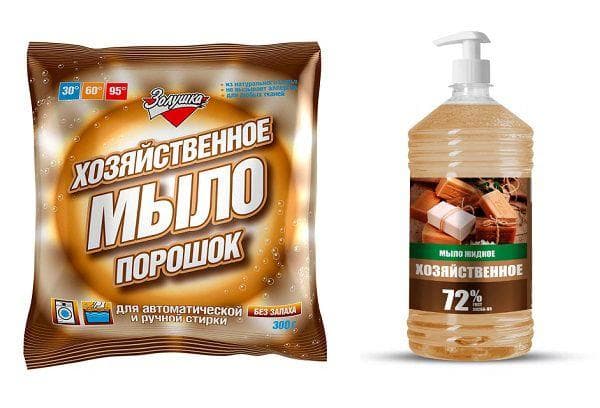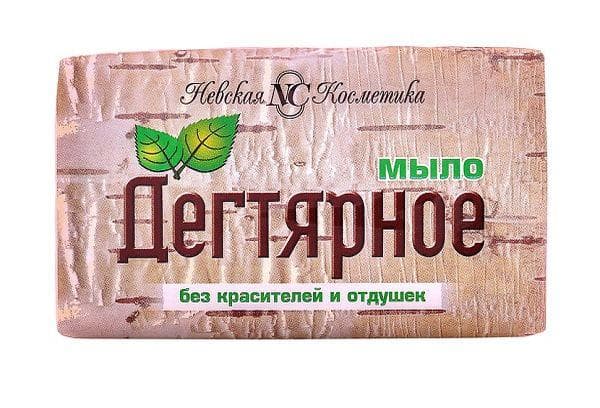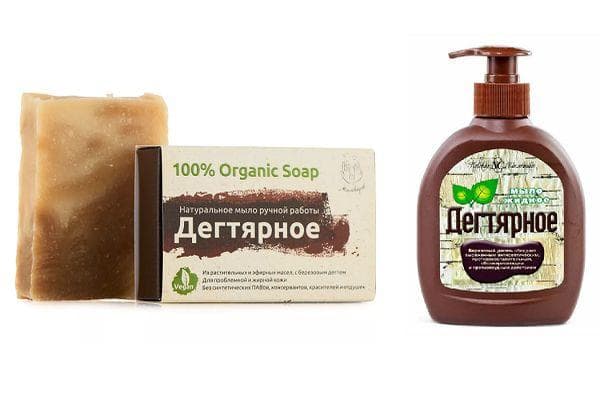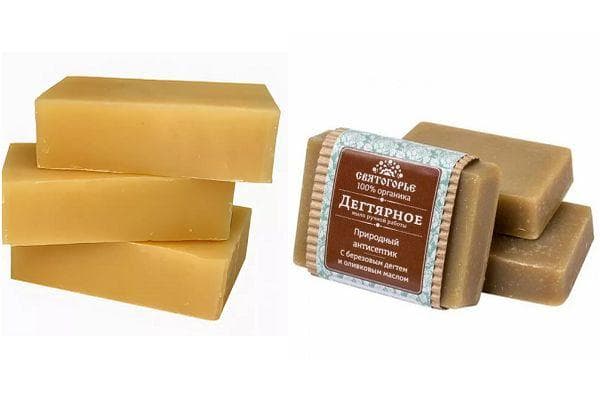Two iconic soaps: which is better, tar or laundry?
Content:
Laundry soap is used in everyday life, and tar soap is used for medical purposes. It is impossible to say unequivocally which soap is better, laundry or tar. It all depends on the application. These are two different soaps, differing in composition and properties.
How did laundry soap come about?
In Soviet times, there were three types of soap: laundry, bath (toilet) and children's. The household product was distinguished by the fact that it was good at washing various types of dirt. They washed floors and dishes with him. The brown block replaced all the household chemicals that are available now.
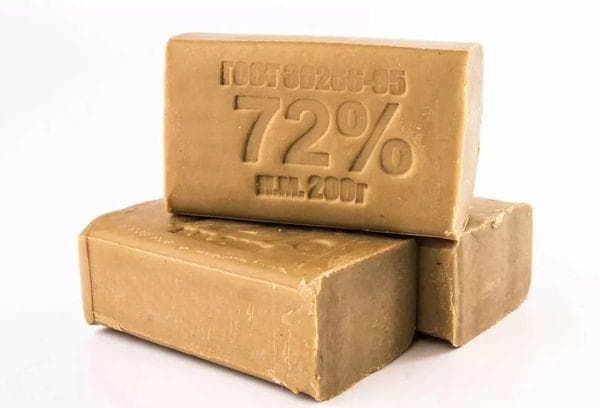
The first similar soap was born in Marseille (France) in the Middle Ages. Olive oil and salt were used to produce it.
In Russia, laundry soap is made from vegetable fats, oil, and salt. It is allowed to use fats of animal origin - lamb, beef, fish, pork. Due to its high alkali content, soap foam has a pronounced disinfecting effect - it prevents the growth of bacteria and promotes wound healing.
Kinds
Laundry soap contains increased amounts of acids and alkalis.
In the classic version, it looks like a rectangular brown bar with pressed numbers - 65, 70 or 72. They indicate the percentage of fatty acids. The higher the indicator, the better the soap copes with removing contaminants. According to the form of release, soap is distinguished:
- Liquid. Convenient to use, but may contain fragrances and synthetic detergents.
- Lumpy. Inexpensive and natural. The best grade is considered to be 72% soap.
- Powdery. Designed for washing thin and delicate fabrics, used in industry (in metallurgy for drawing wire).
The color of the soap can vary from light yellow to dark brown, depending on the degree of cleaning. The unrefined version smells stronger.
Top 5 manufacturers: “Nevskaya Kosmetika”, “Cinderella” (liquid), “Spring”, “Agafya”, “Duru Clean&White”.
Advantages and disadvantages
There are legends about the beneficial properties of laundry soap. They not only wash and wash clothes, but also strengthen hair, treat ARVI, thrush, acne, and replace antiperspirant. Pediatricians advise washing newborn diapers, clothes and bedding for allergy sufferers with laundry soap. Unlike modern detergents, it never causes allergies.
Advantages:
- wide scope of application;
- low price;
- hypoallergenic.
Flaws:
- smell.
Some people describe the smell of laundry soap as smelling like feces. They categorically refuse to use it, despite all the advantages. To be fair, today there are products with fragrances that muffle the natural aroma. But often the better the soap smells, the more harmful chemicals it contains.
What is tar soap used for?
The main area of application of tar soap is cosmetic. It is used:
- for the treatment of psoriasis and seborrhea;
- as an antiparasitic against lice;
- for various types of dermatitis;
- against inflamed acne;
- from black spots on the face;
- from hair loss.
The therapeutic effect is achieved due to the content of tar, a potent natural substance. It is obtained from birch bark by simmering in an airtight container. Tar has a pronounced antibacterial and anti-inflammatory effect, promotes the regeneration of damaged skin and improves blood circulation.
Important! Tar is an allergen. You need to use it carefully, observing the reaction. Signs of an allergy include redness and itching.
The product should not be used frequently due to its ability to dry out the skin. For a therapeutic effect, application 2-3 times a week is sufficient.
Kinds
Essentially, tar soap is a mixture of ordinary soap and tar. It contains up to 10% tar, the rest is a soap base: sodium salts of fatty acids, palm and other vegetable oils, water, sometimes fragrances, dyes. The composition of the product differs from different manufacturers. To reduce its cost, synthetic detergent components can be used.
The following types of tar soap are distinguished:
- Lumpy. Classic option. It looks like a brown bar with a pronounced tar smell. Its cost is affordable, and its composition is often as close to natural as possible.
- Liquid. Its main advantage is ease of use. As a rule, liquid tar soap foams better and smells nicer, but contains surfactants and various synthetic additives.
Top 5 manufacturers of tar soap: “Vesna”, “Nevskaya Kosmetika”, “Agafya”, “Kleona”, “Babushkina Pharmacy”.
Advantages and disadvantages
Tar soap stands out noticeably among other types of soap. Its undoubted advantages are:
- healing effect;
- affordable price compared to other cosmetic and medicinal products;
The disadvantages of the product include:
- specific smell;
- narrow scope of application;
- allergenicity.
The fat composition of the product corresponds to group 3 toilet soap. This means that its foam is weak and not stable. In addition, tar soap absorbs water well. It is not very convenient to use it as a detergent, as well as for household needs. It copes worse with dirt and leaves behind a tar smell.
What is the difference between laundry soap and tar soap?
These two types of soap may be similar in appearance - both are dark in color, with a specific smell, in the lump version they are large bars. Photo:
But even with a remote external similarity between tar and laundry soap, the difference is clearly visible:
- Tar soap is darker, has a sharp tar smell, vaguely reminiscent of burning from a fire. Laundry soap is lighter in color, often has engravings with numbers, and has a special smell. Its smell is unlike anything else and is difficult to describe.
- Laundry soap has a wide range of applications; it can be used for washing, cleaning, disinfecting wounds, and in the garden. Tar soap is mainly used against dandruff, acne, skin diseases, and for hair care.
- Tar soap differs in composition - it contains birch tar. Laundry soap does not have such a component.
comparison table
Those who have at least once used both soaps clearly understand the difference between them. We suggest comparing their characteristics in the table:
| Laundry soap | Tar soap | |
| Application area | Laundry washing, wet cleaning | Solving cosmetic and medical problems: acne, dandruff, psoriasis and others |
| Compound | Sodium salts of fatty acids, water, sodium chloride (salt). May contain bleaches, fragrances, preservatives, dyes | Sodium salts of fatty acids, water, sodium chloride (salt), birch tar. May contain fragrances, dyes, foaming agents |
| Kinds | 65%, 70%, 72%, liquid, solid, powder | lump, liquid |
| Smell | Sharp, specific, quickly disappears | Sharp, specific, long lasting |
| Additional properties | Effective for disinfecting wounds, controlling pests on plants, against inflammation of the skin | Helps against lice |
| Laundry | Removes stubborn stains and disinfects | Not usually used |
| Effect on skin | Reduces inflammation, cleans well, dries | Heals, cleanses, dries, relieves inflammation |
| Hypoallergenic | Yes | No |
| Main advantage | Inexpensive and effective product with a wide range of applications | Pronounced cosmetic and therapeutic effect |
| Main disadvantage | Smell | Not suitable for everyone (allergenic, smell) |
| Price for 200 g (ml) | 20-70 rubles | 35-250 rubles |
Which is better to choose?
The choice of means depends on the goals pursued:
- To wash clothes and clean the room, you should choose laundry soap.
- Tar soap is better suited for solving cosmetic problems. An exception is an allergy to tar.
It is also worth considering the smell. Both products have a specific one.
Which is better according to reviews?
Despite the large selection of modern products - detergents and cleaners, washing powders, cosmetics, tar and laundry soap are very popular. First of all, they are in demand among the older generation, who are familiar with the effectiveness of the products firsthand and have been using them since childhood.
First of all, buyers value naturalness in laundry and tar soaps.
The reviews do not compare them, so it is not possible to determine which is better. They are used for different purposes.
Reviews of tar soap
Tar soap is not suitable for everyone, so reviews about it are not always positive. You need to be prepared for a specific smell, and after washing, apply a moisturizer.
- Lena K.: “I recommend this product to all girls with problematic and oily skin. Tar soap really improves its condition, cleanses it incomparably (no other washes can compare), gets rid of acne and prevents the appearance of new ones. I use it to prevent rashes before menstrual periods. Helps out a lot!”
- Violet: “I’ve been friends with tar soap for 30 years. Dandruff appears periodically since adolescence. As soon as my head starts to itch, I make a soap foam and apply it to the roots of my hair. After an hour I wash it off. I also like the tar shampoo “Psorilom”, but it costs more.”
- Ruslan: “It helped with rashes on my face as a teenager. But the smell is terrible.”
- Julia: “I read laudatory reviews and bought myself a bar of tar soap. I don't understand how people use it. I couldn’t comb my hair after washing, the whole skin on my face felt tight, and the smell was just something! I stood in the bathroom for two days and it was impossible to get in. I’m generally silent about my hair!”
- Ksyusha: “I am 18 years old, and the pharmacy recommended tar soap for acne.I used it for a month and my face became clear. But it didn’t suit my mother because she has sensitive and dry skin.
- Marina: “Always lies in the bathroom in case a pimple pops up. And I even like the smell - natural, either tree bark or a fire. You just need to get used to it."
Reviews of laundry soap
Laundry soap is often used along with modern household chemicals. Most people use it to wash socks and stubborn stains. Less common are those who use it for everything: washing dishes, washing the body, washing hair, cleaning the house, and gardening. Reviews from fans and opponents of laundry soap:
- Kate: “Tar, laundry soap is some kind of relic of the past. The stores are full of harmless household chemicals that do their job flawlessly. I’m generally silent about using it on the body and hair. They need nutrition and hydration, but soap only dries them out.”
- Olga: “I buy laundry soap “Effect 78%.” I love its smell. It reminds me of unrefined oil. I use it to wash underwear, socks, baby diapers, and remove stubborn stains. Works better than any stain remover."
- Oksana: “After I was diagnosed with allergic dermatitis to powders and gels, I began using laundry soap to wash dishes. At first it was uncomfortable, but then I got used to it. But my health is fine. It cleans and washes everything perfectly. And you don’t need to rinse it many times, everything creaks after the first time. Saving water."
- Sergey: “I use laundry soap against pests. Helps against aphids, thrips and any other scourge on plants.”
- Sasha: “I have laundry soap in my medicine cabinet. The doctor advised us to disinfect wounds with it, especially after bites from dogs, cats, and ticks.And just treat children’s broken knees.”
- Arina: “An irreplaceable item for hand washing. It washes well. I don’t really like the smell, but it’s tolerable and dissipates quickly. It is also useful to wash with laundry soap for those with oily skin. It removes acne well. After a shower, all the pores open and the body breathes.”
Questions and answers
What is the difference between laundry and tar soap from toilet soap?
Toilet soaps are intended for washing hair and body, and shaving. They have a neutral PH and do not harm the skin when used daily. Tar and laundry soap have a narrow specialization and are used for medicinal purposes and as household chemicals.
Who is contraindicated for tar and laundry soap?
People with high sensitivity to odors, thin and dry skin, brittle hair (as a cosmetic product). Tar soap is contraindicated for allergy sufferers. Before using it, it is recommended to consult a dermatologist or cosmetologist.
Laundry and tar soap have become famous for their 100% organic nature. They are very popular among connoisseurs of environmentally friendly products. Usually they don’t choose which soap is better, but buy both types at once. They wash their hair and body with tar, wash their faces, and with the help of household items, they clean up the house, wash clothes, and, if necessary, disinfect wounds.
